January 2015, Volume 26, Issue 1
The Weight of Geopolitics
Can democracy prosper when democratic countries are in geopolitical retreat? History cautions against the notion that democracy will inevitably prevail.
January 2015, Volume 26, Issue 1
Can democracy prosper when democratic countries are in geopolitical retreat? History cautions against the notion that democracy will inevitably prevail.
January 2015, Volume 26, Issue 1
Rather than being in decline, democracy is in crisis due to the gap between the democratic ideal and how democracy is actually being practiced. It will survive by transitioning into a new, as yet unknown, form.

January 2015, Volume 26, Issue 1
In contrast to the conventional wisdom that democracy is in retreat worldwide, the evidence tells a different story: The state of global democracy has been stable over the last decade and is actually better than it was in the 1990s.

January 2015, Volume 26, Issue 1
Democracy has been in a global recession for most of the last decade, and committed and resourceful engagement by the established democracies is necessary to reverse this trend.
October 2014, Volume 25, Issue 4
A review of The Confidence Trap: A History of Democracy in Crisis from World War I to the Present by David Runciman.
July 2014, Volume 25, Issue 3
Regime change will always be a feature of political life, but we are unlikely to see again transitions to democracy on the scale of the “third wave.”
April 2014, Volume 25, Issue 2
Civil-liberties scores have notably declined over the past several years, while political-rights scores have slightly improved—perhaps because modern authoritarians have begun to adopt subtler means of repression. Overall, however, freedom experienced a global decline for the eighth straight year in 2013.
April 2014, Volume 25, Issue 2
Home to about a quarter of the world’s people, South Asia presents a murky and not very encouraging picture when it comes to democracy.
April 2014, Volume 25, Issue 2
After two decades of elections that produced a number of alternations in power, an impasse over “caretaker government” crippled the 2014 contest and has made single-party rule all too real a prospect.
April 2014, Volume 25, Issue 2
With the defeat of the Tamil Tigers in a 26-year civil war, Sri Lanka had a chance for genuine reconciliation, but that chance is being squandered by the government of President Mahinda Rajapaksa.
October 2013, Volume 24, Issue 4
A review of The Promise of Power: The Origins of Democracy in India and Autocracy in Pakistan by Maya Tudor.
April 2012, Volume 23, Issue 2
Although in 2011 declines in freedom exceeded gains for the sixth straight year, the uprisings in the Arab world represent the most significant challenge to authoritarian rule since the collapse of Soviet communism.
April 2011, Volume 22, Issue 2
Having only recently emerged from a prolonged and remarkably bitter civil war, Sri Lanka is now slipping steadily under the hardening authoritarian control of President Mahinda Rajapaksa and his family.
January 2011, Volume 22, Issue 1
A review of Lonely Power: Why Russia Has Failed to Become the West and the West Is Weary of Russia by Lilia Shevtsova.
January 2002, Volume 13, Issue 1
The Editors’ introduction to “South Asia Faces the Future.”
October 2001, Volume 12, Issue 4
Except for the Baltic states, the countries of the former Soviet Union may be less democratic today than in the last years of the USSR.
October 2001, Volume 12, Issue 4
In Russia, formally democratic institutions coexist uneasily with the reality of tightly consolidated bureaucratic and executive power.
April 2001, Volume 12, Issue 2
The Editors’ introduction to “High Anxiety in the Andes.”
April 2001, Volume 12, Issue 2
The conventional wisdom about Venezuela’s plight is largely mistaken. Only when Venezuelans recognize the real causes of their woes will they be able to make progress in overcoming them.
April 2001, Volume 12, Issue 2
The November 2000 parliamentary elections, expected to be a step forward for democracy, instead turned into a major setback, casting doubt on the country’s future stability.
January 2001, Volume 12, Issue 1
The military regime of General Musharraf has been less repressive than many had feared, but there is little sign that it is overcoming the deep-seated problems that led to the failure of Pakistani democracy.
July 2000, Volume 11, Issue 3
Pakistan’s descent into authoritarian rule starkly depicts the “triple crisis of governance” that threatens many third-wave democracies. If these problems of governance are not addressed, a new “reverse wave” of democratization could be imminent.
April 2000, Volume 11, Issue 2
A quarter-century after the classic study The Crisis of Democracy was published, three distinguished political scientists find that, though the “crisis” may have disappeared, public confidence is on the decline in almost all the world’s advanced democracies.
October 1999, Volume 10, Issue 4
Read the full essay here.
July 1999, Volume 10, Issue 3
Read the full essay here.
April 1999, Volume 10, Issue 2
Read the full essay here.
July 1995, Volume 6, Issue 3
A review of Strong Parties and Lame Ducks: Presidential Partyarchy and Factionalism in Venezuela, by Michael Coppedge and Democracy for the Privileged: Crisis and Transition in Venezuela, by Richard S. Hillman.
January 1995, Volume 6, Issue 1
Read the full essay here.
April 1994, Volume 5, Issue 2
Read the full essay here.
April 1994, Volume 5, Issue 2
Read the full essay here.
April 1994, Volume 5, Issue 2
Read the full essay here.
October 1992, Volume 3, Issue 4
Read the full essay here.

The quick reversal of President Yoon’s martial-law order is being celebrated as a democratic victory. But the problems run deeper than one man. What comes next?

Want to distract the public? Little works better than family feuds ripped from soap opera plotlines. That’s how the Marcos and Duterte clans keep people glued to the drama while crowding out democratic reform.
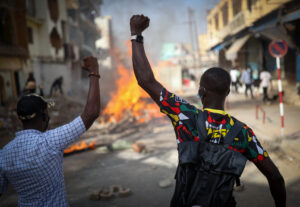
Democracy is more resilient than many people realize, but that doesn’t mean there aren’t worrying signs on the horizon.
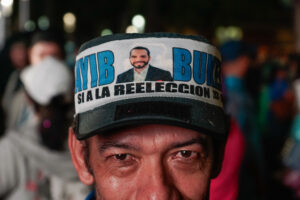
Of course not. But the region’s democratic hopes are fighting an uphill battle against corruption, crime, and a violent past.
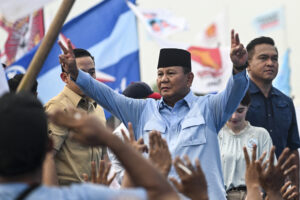
Indonesian voters have made Prabowo Subianto, a special-forces commander with a dark past, their next president. Even as voters flocked to the polls, his election is a harbinger of democracy’s decline.
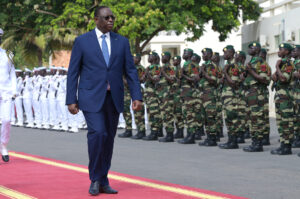
President Macky Sall has called off his country’s presidential election just weeks ahead of the vote. His unconstitutional decree will not only keep him in power, but threatens to throw Senegal into violent chaos.

The case for liberal democracy remains powerful. It may get its biggest boost in the near term from success on the battlefields of Ukraine.
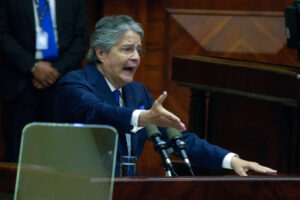
The small Latin American country was a brief democratic bright spot. But it appears to have fallen victim to a clash between populists and anti-populists, without a democrat in sight.


This is the darkest moment for freedom in half a century. Whether democracy regains its footing will depend on how democratic leaders and citizens respond to emboldened authoritarians and the fissures within their own societies.
In many parts of the world, democracy seems to be under threat. Populism is on the rise, as is public dissatisfaction with such key features of liberal democracy as political parties, representative institutions, and minority rights. Even in the long-established democratic regimes of Western Europe and the United States, attachment to democracy is weakening, particularly…
January 10, 2017
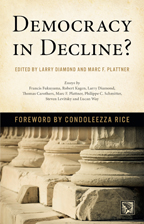
For almost a decade, Freedom House’s annual survey has highlighted a decline in democracy in most regions of the globe. Some analysts say this shows that the world has entered a "democratic recession." Others dispute that interpretation, emphasizing democracy’s success in maintaining the huge gains it made during the last quarter of the twentieth century.